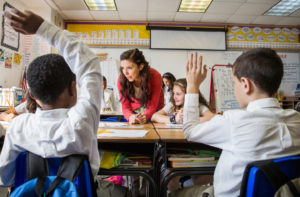School choice advocates launch campaign to amend Oregon Constitution
A grassroots campaign in Oregon is collecting signatures to get two school choice constitutional amendments on the ballot.
Although lawmakers in many states are working to implement school choice…

A grassroots campaign in Oregon is collecting signatures to get two school choice constitutional amendments on the ballot.
Although lawmakers in many states are working to implement school choice through legislation, including in the Beaver State, Education Freedom for Oregon (EFO) is trying a different route.
“Progress just was not being made in the legislature, and we think Oregon students deserve the ability to choose the learning environment that’s best for them and have access to Oregon’s education dollars,” Donna Kreitzberg, executive director of EFO, told The Lion.
Kreitzberg, a former lawyer and CPA, explained that amending the constitution gives Oregonians the ability to vote directly on the issues and would cement school choice in the constitution, regardless of the whims of the legislature.
One of the amendments would create education savings accounts (ESAs) of at least $7,600 annually per participating student. Those funds could be used for various educational expenses, including tuition at a private school. The other amendment would guarantee open enrollment within the public school system, enabling students to leave failing, locally-zoned public schools.
Kreitzberg sees the amendments as supporting the same parental rights the Supreme Court recognized in a 1925 case which originated in Oregon.
“Parents have the right and the duty to educate their children,” Kreitzberg says of the Court’s decision. “We’re codifying that [decision] into the Oregon Constitution to make sure that any future laws reflect that it’s the parents who have the voice and the control of the education of their children.”
The effort comes after public schools across the nation have lost over a million students since the pandemic, many of which ended up in private or home schools. These trends have coincided with an increased support for school choice across party lines.
Oregon currently has 40% more homeschoolers than it did in 2019. While traditional public schools lost nearly 7% of their enrollment, public charters – a more independent version of public schools – increased by almost 19%.
Meanwhile, the state is facing other big challenges which Kreitzberg believes better education can address.
Since 2020, homelessness in Oregon increased by over 22%, and nearly one out of every 10 people are addicted to drugs.
“We believe that educating and helping our children reach their full potential are good solutions to those problems,” she said.
“There have been 30 years of studies that show that bringing school choice helps all of the students,” Kreitzberg continued. “It helps the students who remain in public school, it helps the students who go into the private sector, both achieve better academic success and also experience higher graduation rates.”
Each amendment requires roughly 250,000 signatures to make it onto the ballot as early as November 2024.
“We’re really excited about it because we have lots of volunteers, lots of excitement, a lot of parents out there who believe that there are artificial barriers on the ability of our children right now to get a good education,” concluded Kreitzberg.
“We’re trying to use these two amendments to remove those barriers, give parents the full choice of all the different learning environments for their children and then hopefully with that the children will be able to achieve their full potential.”



